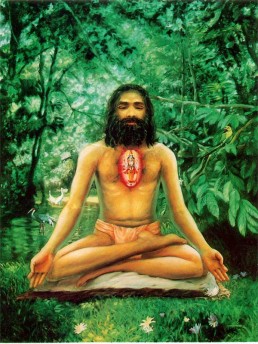Swami Chinmayananda
Swami Chinmayananda Commentary
Earlier we were told that on reaching his goal, the meditator “ATTAINS INFINITE BLISS OF THE ‘BRAHMAN’-CONTACT” (V-28). We explained that the term ‘contact’ indicates only the non-dual Reality, which is the theme of all the Upanishads. Here, in this stanza, we have Krishna’s own commentary upon that term. Once having awakened to the Self, the Perfect Master thereafter recognises everywhere nothing but the Self.
HE WHO SEES ME IN ALL THINGS AND SEES ALL THINGS IN ME — In this stanza, as everywhere else, the first person singular ‘I’ and ‘Me’ are to be understood as the Self. To one who is re-reading the stanza in the light of this annotation, this and the previous stanza together express more fully the pregnant meaning of the most famous Upanishadic declarations found in the Ishavasya.
HE NEVER BECOMES SEPARATED FROM ME — On transcending the intellect, the experience of the ego is not that it sees or perceives or cognises the Eternal but that it discovers itself in essence to be nothing but the Self (Shivoham). The dreamer, on awakening, himself becomes the waker; a dreamer can never see or recognise the waker as separate from himself.
NOR DO I BECOME SEPARATE FROM HIM — The dualists are rather hesitant to accept that Infinite Divinity is their Real Nature, for they are, as ego-centres, conscious of their own bodily vanities and sins. In no clearer terms can we more exhaustively describe the unadulterated Truth of the Essential Divinity in man. Lord Krishna here, is in no way trying to conceal His meaning that a meditator, when he has fulfilled the process of detachment from the not-Self, himself BECOMES the Eternal and the Infinite. It may be a staggering truth, but all the same it is The Truth. Those who are hesitating and wavering may well continue to disbelieve their own divine potentialities. But the intimate experience of the long hierarchy of Gurus in India and the mystic Saints all over the world has endorsed this unbelievable, yet plain Truth that, “the Self in an individual is the same Self everywhere.”
At present we are divorced from ourselves; the ego is a rebel who has exiled himself from his native kingdom, the Self. On rediscovery of the Self, the ego BECOMES the Self in such a happy blending that thereafter there is no distinction between the ego and the Self. On awakening, the dreamer becomes the waker; not only does the dreamer become the waker, but the waker can never remain separate from the dreamer. In ordinary divorces either party can divorce the other, and yet maintain an emotional relationship with each other. Here the Lord says, not only does the seeker come to feel the Self-hood, but I, the Self, become homogeneously one with him.
In fact, once we understand that “Misguided God is a man,” it becomes amply clear that, rightly guided, a man rediscovers himself to be nothing other than the Supreme. An actor playing the part of a beggar, is not really a beggar; the moment he drops the part he is playing, he becomes what in fact he is. In fact, even while he was playing his role, he was not a beggar. This daring declaration of Vedanta is not at all difficult to understand, but the deluded are aghast at this revelation, and in their imperfections, refuse to believe this Truth. They have not the guts to take the responsibilities of living a Godly life. Krishna’s courageous statement in this stanza leaves not even a pin-hole of a doubt on this sacred conclusion of all the scriptures of the world, especially that of the immortal Upanishads.
EMPHASISING THE IDEA THAT THE MAN OF PERFECT SELF-CONTROL AND MEDITATION, ON REALISING THE SELF “BECOMES THE SELF,” THE FOLLOWING IS ADDED:
Adi Sankara Commentary
Yah, one who; pasyati, sees; mam, Me, Vasudeva, who am the Self of all; sarvatra, in all things; ca, and; sees sarvam, all things, all created things, beginning from Brahma; mayi, in Me who am the Self of all;-aham, I who am God; na pranasyami, do not go out; tasya,of his vision-of one who has thus realized the unity of the Self; ca sah, and he also; na pranasyati, is not lost; me, to My vision. That man of realization does not get lost to Me, to Vasudeva, because of the indentity between him and Me, for that which is called one’s own Self is surely dear to one, and since it is I alone who am the seer of the unity of the Self in all.
The Bhagavad Gita with the commentary of Sri Sankaracharya – Translated by Alladi Mahadeva Sastry
Holy Geeta – Commentary by Swami Chinmayananda
The Bhagavad Gita by Eknath Easwaran – Best selling translation of the Bhagavad Gita
The Bhagavad Gita – Translation and Commentary by Swami Sivananda
Bhagavad Gita – Translation and Commentary by Bhaktivedanta Swami Prabupadha
Srimad Bhagavad Gita Chapter 6 – Verse 30 – 6.30 yo mam pasyati – All Bhagavad Gita (Geeta) Verses in Sanskrit, English, Transliteration, Word Meaning, Translation, Audio, Shankara Bhashya, Adi Sankaracharya Commentary and Links to Videos by Swami Chinmayananda and others – 6-30

